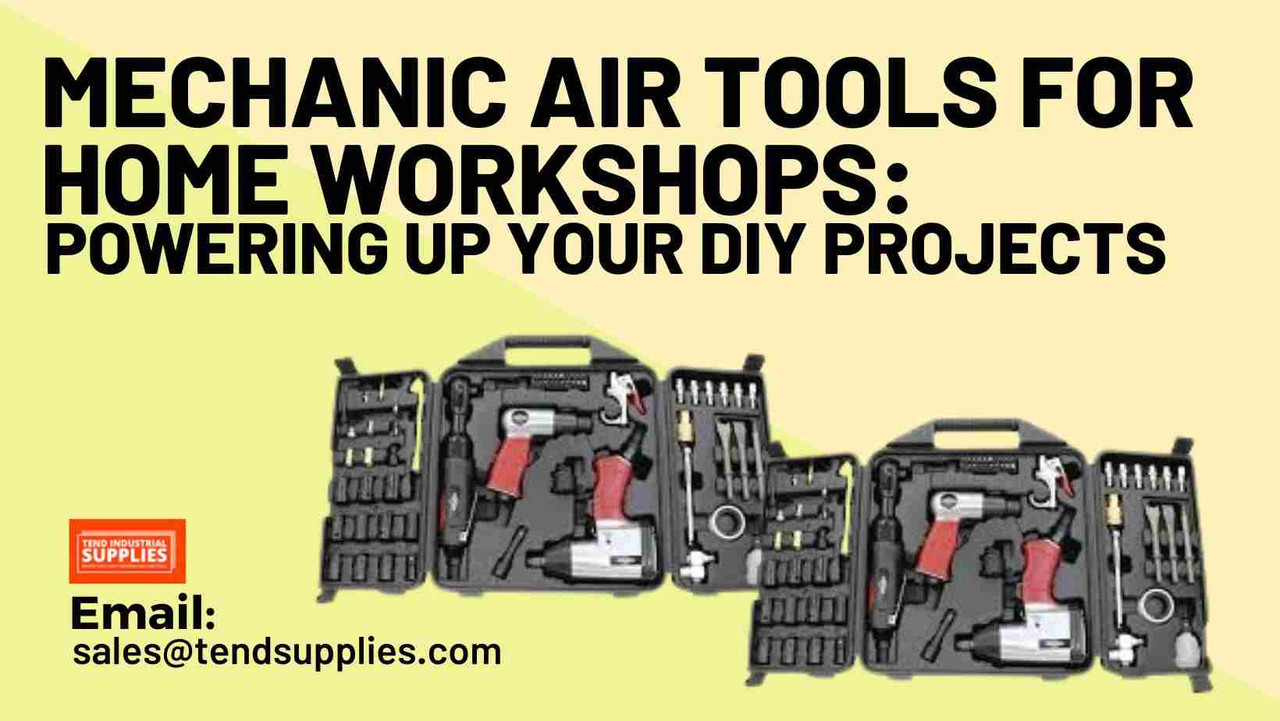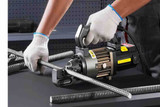Mechanic Air Tools for Home Workshops: Powering Up Your DIY Projects
As a home DIY enthusiast or budding mechanic, having the right tools can make all the difference in your projects. Mechanic air tools are among the most versatile and powerful additions to any home workshop. These pneumatic powerhouses can revolutionize your work, offering efficiency, precision, and power that manual tools simply can't match. In this comprehensive guide, we'll explore the world of mechanic air tools for home workshops, helping you understand their benefits, uses, and how to choose the right ones for your needs.
Key Takeaways
- Mechanic air tools offer significant advantages in power, durability, and versatility for home workshops.
- Impact wrenches, ratchets, drills, die grinders, sanders, and spray guns are essential air tools for a home workshop.
- Proper setup of your air tool system, including a suitable compressor and accessories, is crucial for optimal performance.
- Regular maintenance, including daily lubrication and cleaning, is key to ensuring the longevity of your air tools.
- When choosing air tools, consider your project needs, usage frequency, compressor compatibility, and ergonomics.
- Always prioritize safety when using air tools by wearing appropriate PPE and following manufacturer guidelines.
Understanding Mechanic Air Tools
Mechanic air tools, also known as pneumatic tools, are powered by compressed air. They convert the energy from compressed air into mechanical work, allowing for powerful and efficient operation. These tools are widely used in professional auto shops and are increasingly finding their way into home workshops due to their numerous advantages.
Key Benefits of Mechanic Air Tools
- Power-to-Weight Ratio: Air tools typically offer a higher power-to-weight ratio compared to their electric counterparts. This means you get more power in a lighter, more maneuverable package.
- Durability: With fewer moving parts and no electric motors to burn out, air tools often last longer than electric tools, especially in heavy-duty applications.
- Versatility: From impact wrenches to spray guns, the range of air tools available can cover almost every task in a home workshop.
- Safety: Air tools don't have electrical components, reducing the risk of electric shock, especially in damp conditions.
- Continuous Operation: Unlike battery-powered tools, air tools can run continuously as long as they're connected to an air compressor.
Related Articles:
Essential Pneumatic Tools for Every Workshop: A Beginner's
15 Essential Pneumatic Tools Every Workshop Must Have
The Different Air Tools used in an Automotive Workshop
Essential Mechanic Air Tools for Your Home Workshop
Let's dive into some of the most useful air tools you should consider for your home workshop:
1. Air Impact Wrench
The air impact wrench is often the first pneumatic tool that DIY mechanics add to their arsenal. It's perfect for quickly removing and installing lug nuts, bolts, and other fasteners.
Key Features:
- High torque output
- Variable speed control
- Compact design for tight spaces
Uses:
- Changing tires
- Automotive repair
- Assembly and disassembly of large machinery
2. Air Ratchet
An air ratchet is a time-saving tool that excels at removing and installing fasteners in tight spaces where a full-sized impact wrench won't fit.
Key Features:
- Compact head design
- Variable speed trigger
- Reversible operation
Uses:
- Engine bay work
- Underbody repairs
- Appliance repair
3. Air Drill
Pneumatic drills offer high power in a compact form factor, making them ideal for drilling through tough materials or in awkward positions.
Key Features:
- High RPM capabilities
- Keyless chuck for quick bit changes
- Ergonomic design for reduced fatigue
Uses:
- Metal fabrication
- Woodworking
- General construction tasks
4. Air Die Grinder
Die grinders are versatile tools used for grinding, sanding, honing, and polishing various materials.
Key Features:
- High-speed rotation
- Compatible with various attachments
- Compact design for precision work
Uses:
- Metal finishing
- Removing rust or paint
- Sharpening tools
5. Air Sander
Pneumatic sanders make quick work of smoothing surfaces, whether you're working on an automotive project or refinishing furniture.
Key Features:
- Orbital or straight-line sanding options
- Dust collection systems
- Variable speed control
Uses:
- Automotive body work
- Woodworking
- Surface preparation for painting
6. Air Spray Gun
For those interested in painting projects, an air spray gun offers professional-quality results at home.
Key Features:
- Adjustable spray patterns
- Variable flow control
- Easy to clean and maintain
Uses:
- Automotive painting
- Furniture refinishing
- Large-scale painting projects
Setting Up Your Air Tool System
To use air tools effectively in your home workshop, you'll need a proper air compressor setup. Here are the key components:
- Air Compressor: The heart of your pneumatic system. Choose one with sufficient CFM (Cubic Feet per Minute) output to power your tools.
- Air Hose: A durable, flexible hose to connect your tools to the compressor.
- Fittings and Connectors: Quick-connect fittings make switching between tools easy and efficient.
- Air Filter/Regulator/Lubricator (FRL) Unit: This combo unit helps maintain clean, regulated, and lubricated air for your tools.
- Air Tool Oil: Regular lubrication is crucial for the longevity and performance of your air tools.
Maintaining Your Mechanic Air Tools
Proper maintenance is key to ensuring the longevity and performance of your air tools. Here are some essential maintenance tips:
- Regular Lubrication: Most air tools require daily oiling. Use air tool oil and follow the manufacturer's recommendations.
- Clean Air Supply: Ensure your compressor's air filter is clean and functioning properly to prevent contaminants from damaging your tools.
- Proper Storage: Store your tools in a dry place to prevent rust and corrosion.
- Inspect Regularly: Check for wear and tear, loose fittings, or damaged parts before each use.
- Follow Manufacturer Guidelines: Always refer to the user manual for specific maintenance instructions for each tool.
Choosing the Right Air Tools for Your Workshop
When selecting air tools for your home workshop, consider the following factors:
- Project Needs: Assess the types of projects you typically work on and choose tools that align with those needs.
- Frequency of Use: If you'll be using a tool frequently, invest in a higher-quality model for better durability.
- Compressor Compatibility: Ensure your air compressor can provide sufficient CFM for the tools you plan to use.
- Brand Reputation: Look for reputable brands known for quality and durability in pneumatic tools.
- Ergonomics: Choose tools that feel comfortable in your hand to reduce fatigue during extended use.
- Warranty and Support: A good warranty and available customer support can be valuable for long-term tool ownership.
Safety Considerations When Using Air Tools
While air tools are generally safe to use, it's important to follow proper safety procedures:
- Wear Proper PPE: Always use safety glasses, hearing protection, and work gloves when operating air tools.
- Secure Workpieces: Use clamps or a vise to secure items you're working on to prevent them from slipping or flying off.
- Maintain Proper Air Pressure: Follow the manufacturer's recommendations for air pressure to prevent tool damage and ensure safe operation.
- Disconnect When Not in Use: Always disconnect tools from the air supply when changing accessories or when not in use.
- Keep Your Workspace Clean: A tidy workspace reduces the risk of tripping or accidentally activating tools.
- Read the Manual: Familiarize yourself with each tool's specific safety guidelines and operating instructions.
FAQs About Mechanic Air Tools for Home Workshops
Q: Do I need a special compressor for air tools?
A: While you don't need a "special" compressor, you do need one that can provide sufficient air volume (CFM) and pressure (PSI) for your tools. Most home workshop air tools operate best with a compressor that can deliver at least 4-5 CFM at 90 PSI.
Q: How often should I oil my air tools?
A: Most air tools should be oiled daily when in use. However, always refer to the manufacturer's recommendations, as some tools may require more or less frequent lubrication.
Q: Can I use my air tools in cold weather?
A: Yes, but cold temperatures can affect performance and increase the risk of moisture in your air lines. Consider using a cold weather-rated air tool oil and install a water separator in your air line to mitigate these issues.
Q: Are air tools more powerful than electric tools?
A: Generally, air tools offer a better power-to-weight ratio than electric tools, meaning they can deliver more power in a smaller, lighter package. However, advancements in electric tool technology are narrowing this gap.
Q: How long do air tools typically last?
A: With proper maintenance, quality air tools can last for many years, often outlasting their electric counterparts. The lifespan depends on factors such as frequency of use, maintenance, and the quality of the tool itself.
Ready to power up your home workshop with high-performance mechanic air tools? Visit Our Online Shop Tend Industrial Supplies today to explore our wide range of professional-grade air tools designed for DIY enthusiasts and home mechanics. From impact wrenches to spray guns, we have everything you need to take your projects to the next level. Don't let manual tools slow you down – experience pneumatic tools' power, precision, and efficiency. Shop now at tendsupplies.com and transform your home workshop into a high-powered DIY haven!









